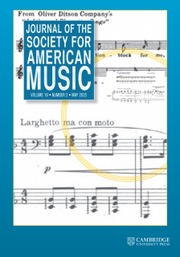No CrossRef data available.
Article contents
“Why We Sing”: David Mahler's Communities
Published online by Cambridge University Press: 01 February 2013
Abstract
American composer David Mahler (b. 1944) has nurtured a career that is independent, diverse, and hard to classify. Democratic, inclusive, and community oriented, Mahler thinks deeply about sound in specific environments, and how music gets made, both by amateurs and professionals. Mahler's work is thus integrally connected to places, to the people in them, and to the songs those people sing. He is influenced and inspired by U.S. traditions of band music arrangements, the ragtime of Joseph Lamb, the songs of Stephen Foster, the bitonality of Charles Ives, the simple harmonic motion of classic minimalism, and the indeterminacy of John Cage. His teachers included Harold Budd, Morton Subotnick, and James Tenney, and he has been an important influence on many composers of his generation, including Michael Byron, Peter Garland, Larry Polansky, Thom Miller, and Stuart Dempster. Defining himself as a “Listener-in-Residence,” he has composed, performed, taught, organized, and directed, all while remaining almost completely unaffiliated with academic institutions. This article provides a portrait of Mahler's career in the context of the communities that have shaped his work and explores how his music responds to the world around him.
- Type
- Research Article
- Information
- Copyright
- Copyright © The Society for American Music 2013




